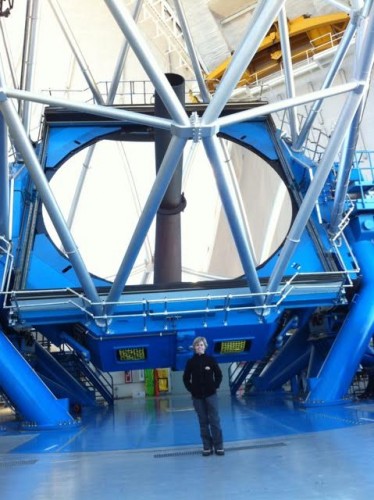- Date: 9 Jun 2017
- Comments: (0)
- Categories: For Everyone
Get to Know Gemini is a new series of blog posts aimed to highlight the different careers, backgrounds, and types of people contributing to Gemini Observatory and its science.

Name: Joanna Thomas-Osip
What is your current position and at which telescope?
I’m the Head of the Science User Support Department stationed at Gemini South but the team is cross-site.
In four lines or less, explain what you do as part of the Gemini Observatory team?
The Science User Support Department (SUSD) was formed a couple years ago to create a collaborative community of users, National Gemini Offices (NGO), and staff and to consolidate the organization of and track existing post-observing support throughout the observatory for more efficient use of resources as well as better visibility amongst our user community. The mission of the SUSD is to advocate for the users and enable Gemini Principal Investigators (PI) to produce world-class scientific results in a timely manner. I lead a team of data reduction software programmers and scientists to maintain public and proprietary Gemini data in an easily accessible archive, provide easy to use tools for accurate data reduction and instructions to use them, coordinate with NGOs for user support within each partner community, and communicate with users throughout the lifecycle of a scientific observing program.
How long have you worked for Gemini?
4 years – before the SUSD I worked as a Science Operations Specialist (SOS) to collect data at night for our PIs.
What drew you to this job?
The chance to create something new and enable the exciting science our PIs do.
What is the best part of your job?
Learning something new everyday.
Where are you originally from/where did you grow up?
Seattle – yes I worked as a barista.
What skill do you think is most important to know for your job?
Listening and enabling my team of experts to do what they do best.
Why is astronomy important?
As one of the more intriguing sciences (perhaps I am biased?), astronomy has the potential to attract young folks and the general public alike to learn more about how the world around them works. Ultimately, however, the pursuit of astronomy is fundamentally a very human one in addressing our origins.
In three lines, explain your PhD thesis.
In order to characterize the aerosols in the atmosphere of Titan, I measured the light scattering properties of a large sample of model aerosols with different morphologies and optical properties using the Microwave Analog Light Scattering Facility at the University of Florida. Then I compared radiative transfer models based on these measurements to the photopolarimetric observations from Pioneer 11 and Voyagers 1 and 2. This analysis predicted the existence of a combination of small Rayleigh-like single particles and aggregates of up to more than 1000 of these.
What are your current research interests?
Lately, I’m interested in characterizing Near-Earth Asteroids.
What is your favorite movie?
The Last of the Mohicans
What is the latest book you have read?
Mindsight by Daniel Siegel
What three albums would you bring with you to a desert island?
What is one hobby of yours?
High performance driving – lapping my 1986 944 turbo around a racetrack – not racing
Favorite beverage?
Espresso drinks, especially a flat white with an extra shot and bit of chocolate
Check back next month to learn more about the staff that help Gemini to explore the Universe and share its wonders!





